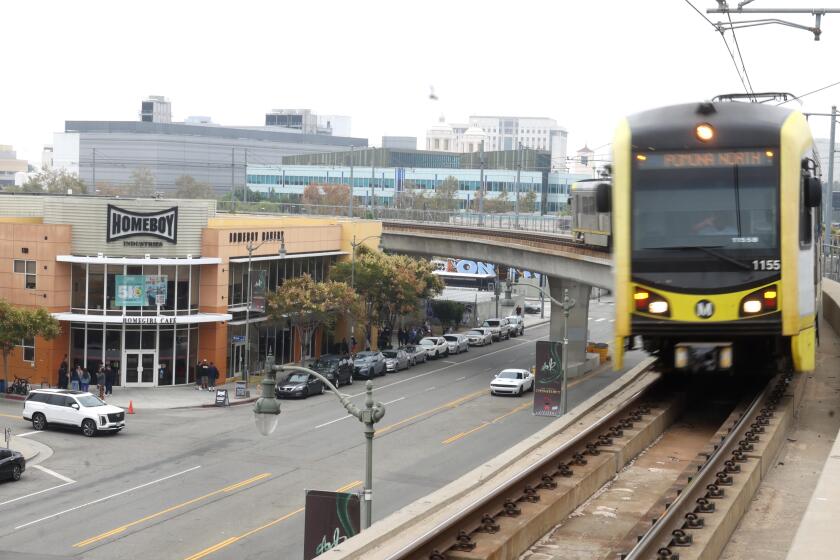Homeboy Industries had kicked off a fundraising campaign to raise $100 million for a major expansion of its facilities downtown.
The gang-member rehabilitation center has big plans to upgrade its campus near Men’s Central Jail downtown to accommodate more people and teach more skills.
Homeboy Industries founder Father Greg Boyle and real estate developer Frank McCourt announced on Friday a campaign to fund a complex that would include temporary housing for people leaving jail and provide services such as healthcare, drug addiction treatment, job training and career development.
McCourt, founder of McCourt Partners and former owner of the Los Angeles Dodgers, pledged the first $10 million to launch the campaign. Homeboy is hoping to raise the rest over the next five years from private donors, along with corporate and philanthropic organizations.
Homeboy was founded 37 years ago to help thousands of formerly incarcerated people and gang-involved youths acquire new skills and avoid returning to jail or prison.
Homeboy is already “the largest gang intervention rehab reentry program on the planet,” Boyle said, with 500 trainees at a time working with 300 staff members, most of whom have completed the rehabilitation program themselves.
Among the well-known enterprises employing trainees are Homeboy Bakery and Homegirl Cafe in Chinatown.
A successful expansion could serve as a national example of how to break the cycle of young former offenders returning to jail instead of becoming productive citizens because they don’t see another path forward, Boyle said.
“We’re a supplier of hope for people to whom hope is foreign,” he said.
Temporary housing would help them find their footing, he said, because 70% of people who enter the program are effectively homeless, sleeping in their cars or couch surfing.
Housing with 200 apartments would be the first phase, to be built on a parcel of land formerly used to store damaged police cars, Boyle said.
After that would come 35,000 square feet of space dedicated to essential services for trainees, including mental health care, substance use disorder treatment, job training and career development.
The expansion designed by Culver City architecture firm KFA would increase Homeboy Industries’ capacity to deliver education, legal assistance, healthcare, and reentry services, Boyle said. Other services include tattoo removal.
Father Greg Boyle, with glasses and a white beard, marches with program enrollees at Homeboy Industries to City Hall for a ceremony marking Father Greg Boyle Day in Los Angeles on May 17, 2024. A vacant lot, behind the fence, is planned to be part of the expansion of Homeboy Industries along Alameda Street in Los Angeles. (Genaro Molina/Los Angeles Times)
As part of the expanded Homeboy campus known as the Fr. Gregory Boyle Center for Radical Kinship, the Homeboy Art Academy would expand into a new 5,000-square-foot space, where hundreds could learn about creative expression across multiple art forms.
The art program is among the 14 social enterprises operated by Homeboy, Boyle said, that include food service, dog grooming and electronic recycling.
During an 18-month training program, trainees work in all 14 social enterprises, acquiring new skills, Boyle said, “and when their 18 months are up, we locate jobs outside of Homeboy.”
The Homeboy development aims to expand a cluster of philanthropic services in the neighborhood, including temporary housing for homeless people provided by the Weingart Center and an affordable housing and medical services complex planned by the California Endowment.
McCourt said his $10-million pledge is intended to “prime the pump” to get the expansion underway and that his firm will provide real estate expertise to help navigate design, construction and other aspects of property development.
McCourt attended Jesuit schools, including Georgetown University, and said he is moved by the approach Boyle, a Jesuit priest, is taking to address what McCourt sees as “dehumanization” of people who have experienced incarceration, gang life and other challenges.
“We need to get back to treating people as people with dignity, respect and provide opportunities,” he said. “Economic development helps because it brings jobs and vitality, but it’s really about caring for people.”
This story originally appeared in Los Angeles Times.

